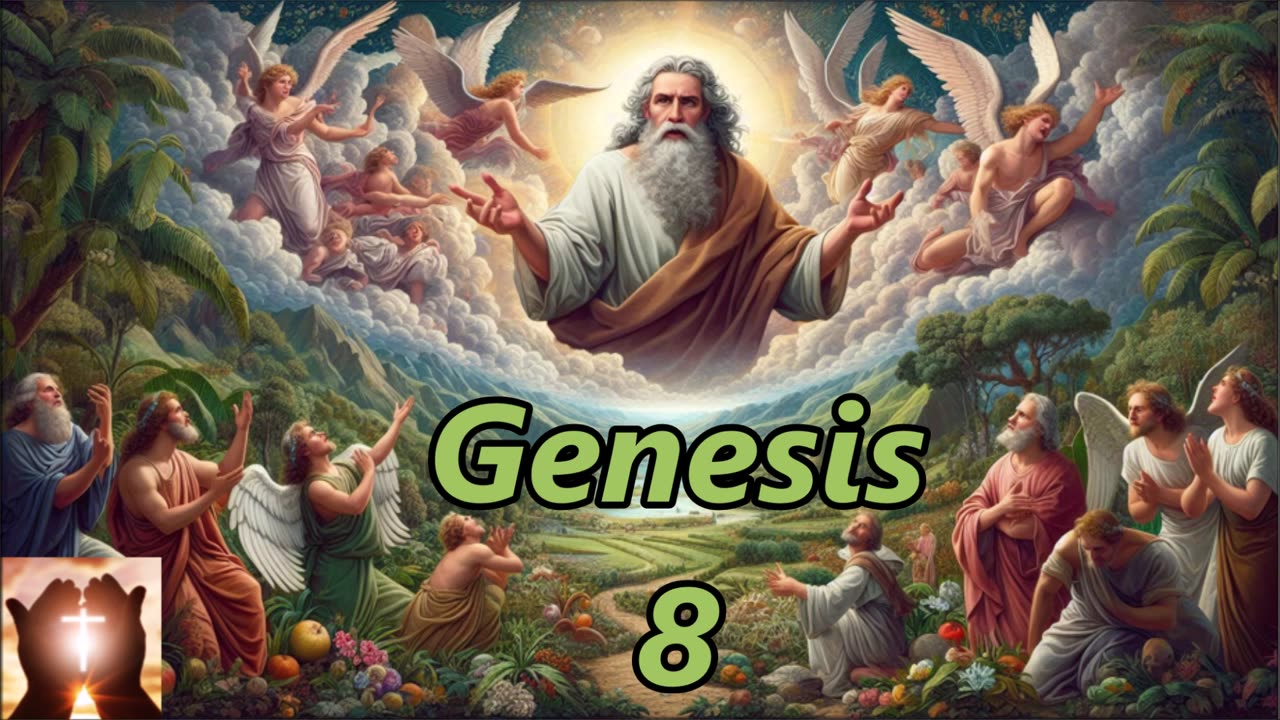Premium Only Content

Genesis 8
Verses 1-5: Receding of the floodwaters.
Verses 6-14: Noah tests the earth’s habitability.
Verses 15-22: Exit from the ark and Noah’s offering.
Summarized Study
1. Genesis 8:1-5 – Receding of the Waters
Analysis: God “remembers” Noah and sends a wind, initiating the receding of the waters. After 150 days, the ark rests on Mount Ararat. The waters continue to decrease until the mountains become visible.
Application: God’s “remembering” reflects His faithful care. He controls creation and brings renewal after judgment.
2. Genesis 8:6-14 – Testing Habitability
Analysis: Noah sends out a raven and a dove to check the land. The dove returns with an olive leaf, signaling dry ground, and later does not return, indicating habitable conditions. The earth is fully dry by the first day of the first month of Noah’s 601st year.
Application: Noah’s patience teaches us to wait for God’s timing for restoration and new beginnings.
3. Genesis 8:15-22 – Exit from the Ark and Offering
Analysis: God commands Noah, his family, and the animals to leave the ark. Noah builds an altar and offers burnt offerings of clean animals. God accepts the offering, promising never again to destroy the earth with a flood, despite humanity’s sinful inclination.
Application: Noah’s worship expresses gratitude for salvation. God’s promise offers hope and stability for creation.
Theological Themes
God’s Sovereignty: God controls the waters and renews the earth, showing His power over creation.
Grace and Mercy: Noah’s salvation and God’s promise reflect His goodness.
Worship: Noah’s offering models gratitude and devotion.
Persistence of Sin: Humanity’s evil inclination remains, but God chooses grace over total judgment.
Controversial Issues
Mount Ararat: The exact location is uncertain; “mountains of Ararat” refers to a region in modern Turkey. Archaeological evidence for the flood is debated.
Chronology: The timeline (150 days, specific dates) may be literal or stylized, with overlapping events.
Olive Leaf: Symbolizes peace and renewal, but its significance is secondary to signaling habitable land.
Practical Applications
Trust in Providence: Believe God remembers you in times of crisis.
Patience: Wait for God’s timing for restoration, like Noah.
Gratitude: Express worship and thankfulness for His salvation.
Hope: Trust in God’s promise to preserve creation, despite sin.
Reflection Questions
How does God’s care for Noah strengthen your trust in Him?
What does Noah’s patience teach about waiting on God?
How can you express gratitude for God’s grace in your life?
-
 6:29:40
6:29:40
SpartakusLIVE
14 hours ago#1 Massive MEAT-HEAD can't stop WINNING, can't stop FLEXING
89.1K -
 5:09:25
5:09:25
Drew Hernandez
15 hours agoGIDEON AI THREAT DETECTION SOFTWARE PUSH & NEW EPSTEIN EMAIL LEAK?
55.8K27 -
 2:03:51
2:03:51
TimcastIRL
11 hours agoTrans Minneapolis Shooter BLAMED Massacre On Mom & Gender Transition | Timcast IRL
200K379 -
 47:29
47:29
Man in America
18 hours agoIT DOESN'T ADD UP: The Trans Shooter's Story Is FULL of Holes
67.6K85 -
 3:59:36
3:59:36
StevieTLIVE
11 hours agoFriday Night Warzone HYPE
48.7K1 -
 3:47:10
3:47:10
SynthTrax & DJ Cheezus Livestreams
1 day agoFriday Night Synthwave 80s 90s Electronica and more DJ MIX Livestream Michael Jackson / AI Art Compilation Edition
56K2 -
 1:03:57
1:03:57
Sarah Westall
11 hours agoMara Lago Accord Joins the Fed, Fed Waves the White Flag & more w/ Andy Schectman
37.1K2 -
 2:44:12
2:44:12
I_Came_With_Fire_Podcast
1 day ago*BREAKING* Special Guest Katarina Szulc
46.5K9 -
 3:22:20
3:22:20
megimu32
11 hours agoOFF THE SUBJECT: FAFO Friday! Bodycams & Mario Kart Mayhem!
30.9K5 -
 55:36
55:36
Flyover Conservatives
1 day ago4 Strategies to Create Opportunity from Nothing - Clay Clark | FOC Show
34.1K1